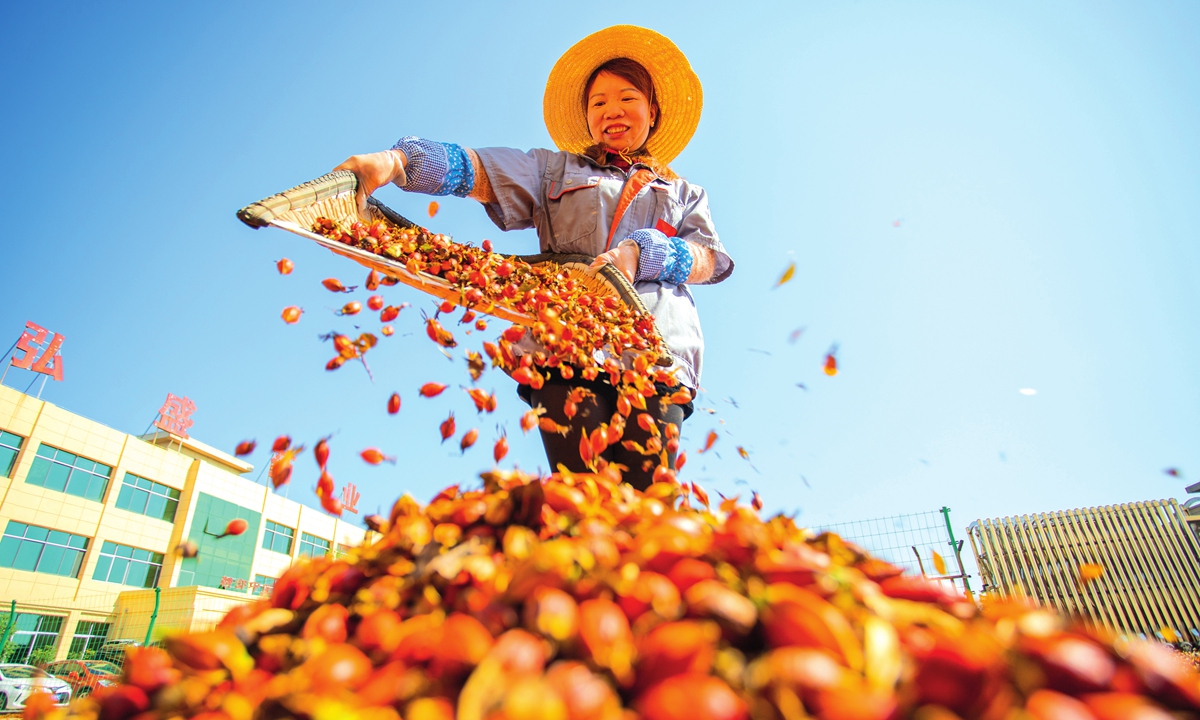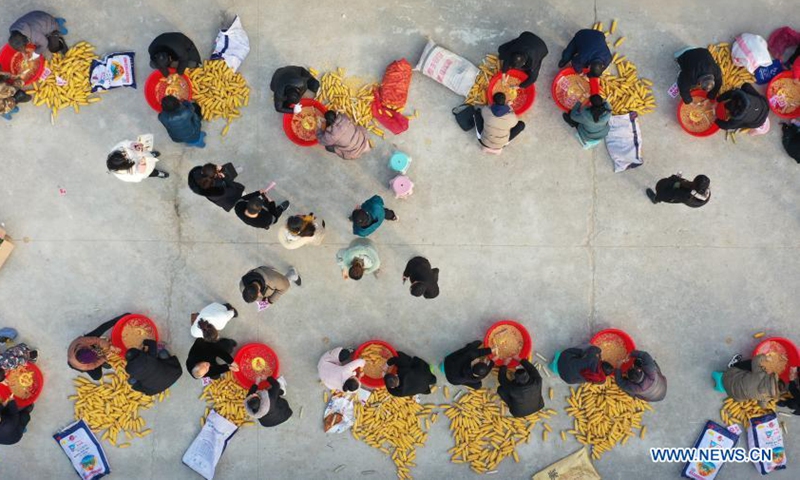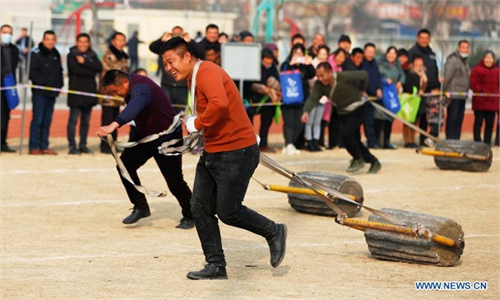
Farmers in Jiujiang, East China's Jiangxi Province harvest Gardenia jasminoides Ellis at a local traditional Chinese medicine base. Photo: IC
An improving domestic seed industry will become a key to addressing many of the agricultural problems China has to face today, analysts said on Wednesday, as China vowed to tackle core bottlenecks in agricultural technologies in its new stage of rural development, vowing to "turn the table" in the seed industry to maintain grain security after a major policy meeting closed in Beijing on Tuesday.
Chinese President Xi Jinping stressed that efforts must be made to promote the efficiency and quality of the agricultural sector and called to boost core technological breakthroughs in the agricultural sector in a bid to seek scientific and technological self-reliance. He made the remarks at the two-day annual central rural work conference which concluded in Beijing on Tuesday, according to the Xinhua News Agency.
As China is set to roll out the 2021 "No.1 Central Document" soon, which will focus, as always, on agriculture, rural areas and farmers' issues - always a top priority in China - the focus has shifted to a possible stranglehold in the agricultural sector.
In a rare move, the top Chinese authority for the first time elevated the need to strengthen the homegrown seed industry in the blueprint that guides the country's agricultural sector. Such a development could cater for people's need for high-quality green food, the nation's necessity to heal its soil and benefit downstream processing sector.
Seeds have been dubbed as the "semiconductor microchips" of the agricultural sector and Chinese analysts said the "turning-the-table campaign" in the $15 billion seed industry comes at the right time. The wording of the statement published after the meeting reflects some of the broader challenges faced by China's agricultural sector - from a possible bottleneck like those faced by some of the country's best technology companies to meet the improved demand of the Chinese people for quality agricultural produce.
A more developed seed industry will also directly contribute to the nation's grain security, they noted.
"The trade frictions with the US, Australia and Canada have brought the lesson home to China's policymakers that imports of agricultural products face restrictions or restraints," said Jiao Shanwei, editor-in-chief of cngrain.com, a website specializing in grain news.
"Working to improve the seed industry will be a desirable field of attention as China has already done a good job in keeping and protecting its arable land, stimulating farmers' enthusiasm to grow crops and ensure grain output," Jiao told the Global Times on Wednesday, noting that the shift comes after China scored a victory in its poverty alleviation campaign, which come to an end at the end of 2020, with 100 million people lifted out of absolute poverty.
Although China does not face an immediate risk in grain seed supplies, the country still lags in bioengineering and biotechnology in a number of fields, from certain types of agricultural produce to animals that provide protein.
Zhao Xiangyu, chairman of Heilongjiang Province-based Liangtai Agriculture Co, told the Global Times that Western seed companies still have advantages over their Chinese counterparts.
"Improved seeds can wield some unique traits," Zhao said. "For instance, soybeans come from a variety developed by a Western company which sheds moisture faster than domestic varieties - a desirable trait during the harvesting process."
"For all the seed companies in Heilongjiang Province, I have not noticed even one that has the scientific strength to offer similar seeds," Zhao said.
Jiao said that seed from Chinese seed companies tends to perform well in a small region, adapted to a certain climate, and this has caused a fragmentation by regions and is bad for economies of scale.
"In Western countries, a few types of seeds are planted over the whole country and this means their produce is more uniform and more competitive," Jiao said.
Li Xinhai, head of Biotechnology Research Institute with the Chinese Academy of Agricultural Sciences, said that China has a tight grip on seeds for its crops, with homegrown seeds accounting for 95 percent of all seeds planted. However, there is a higher degree of foreign reliance in animals raised for meat.
For corn, foreign varieties account for just 10 percent of all seeds planted in China and for vegetables, the figure is 13 percent, Li said, noting that seeds supplied by foreign companies are mainly corn and high-end vegetables such as broccoli, sugar beet and onions.
For animals, however, the degree of reliance on foreign breeds is notably higher, Li said.
"Breeding white meat-type chicken is all from imports while 80 percent of breeding Holstein Friesian cattle is imported. China also imports about 10,000 breeding pigs each year," Li said.
In 2018, China imported 72.68 million kilograms of seeds from abroad, accounting for a mere 0.07 percent of all seeds planted that year.
For corn seeds, the 2018 import ratio was 0.036 percent, according to data from the Chinese Academy of Agricultural Sciences.
Pan Chenjun, senior analyst at Rabobank, a Netherlands-based bank, said that now that the central government is attaching great importance to the issue, it will affect how resources are allocated to animal husbandry.
"China has achieved self-reliance in breeding sheep but is still reliant on foreign imports of breeding pig and breeding cattle," Pan told the Global Timeson Wednesday.
"For pigs, which, together with rice, we industry insiders say are stabilizers of the world, Chinese companies are catching up on some of the breeding technologies to reduce the frequency of imports," Pan noted.
For cattle, China's breeding technology is backward but now the market entrants' attention is not there, Pan said.
However, Pan noted that the risk of being choked on breeding pig supply is not serious as there are plenty of alternative sources from where high-quality pigs can be imported.
The raising of pigs is specially mentioned in the central rural work conference, after African swine fever decimated the nation's stocks.

Aerial photo taken on Dec. 27, 2020 shows farmers competing in a game in Yaogou Township of Sihong County in Suqian, east China's Jiangsu Province. The fun games, held annually in Yaogou Township before the New Year's Day since 2018, consist of eight interesting competitions which are close to farmers' life this year. (Photo by Xu Changliang/Xinhua)
Policy dividend
Hou Yongjun, president of Erenhot Jinguyuan Grain and Oil Co, a rapeseed farmer from Inner Mongolia Autonomous Region, said an improved seed industry will contribute to China's grain security.
Hou said if the country's farmers have access to better seeds, the country's grain security can be put on a firmer footing.
"Without improved seeds, harvests are largely dependent on weather. Good weather means bumper harvests and catastrophic weather leads to no output," Hou said, noting that this has caused grain output in many regions without access to stronger and improved seeds to fluctuate widely, undermining national food security.
Improved seed also needs less fertilizers, which helps the nation's soil from degrading due to repeated use of fertilizers, Hou said.
Jiao said the political will attached to seed research will also likely lead to an increase in China's discourse power in cutting-edge technologies in the field and this is important given that China has to focus on its domestic market to ensure grain supply for economic and social development.
"The bigger the output, the bigger the result," Jiao said.


